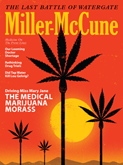Last February, Nike marked the annual celebration of all things African American with the limited release of four separate sets of sneakers. To quote from the company’s marketing copy describing the shoe: “The predominantly black upper of this Black History Month Air Force 1 is a nod to the past, because in the early days of the sport of basketball, shoes on the court were almost always black. The hints of gold all around the shoe are reminders of the golden moment we all are striving to achieve.”
And here I thought the gold was a subtle reference to the mercenary nature of the slave trade. For 2012, perhaps a lovely chain motif for the laces?
Shukree Hassan Tilghman makes only passing reference to Nike during his enjoyably droll documentary More Than a Month, which will be broadcast on PBS February 16 as part of the Independent Lens series. But there are so many comically absurd by-products of Black History Month to contemplate. Fifty years ago, African Americans in the South were forced to sit in the back of the bus; today, the sides of buses are splashed with ads urging riders to “Celebrate Black History Month with Heineken.”
[youtube]XOjU9mjo6nA[/youtube]
Tilghman finds this commercialization — not to mention the shift of focus away from actual history — simultaneously amusing, puzzling, and disturbing. His film asks whether Black History Month has outlived its usefulness and, in the process, raises pointed questions about race, culture, and the stories we tell ourselves about ourselves.
The idea of setting aside a period of time to focus on black history dates back to 1926, when African American historian Carter G. Woodson inaugurated Negro History Week. (The concept spread around the nation with surprising speed, morphing into a month in the wake of the 1960s civil rights movement.) In a memorable e-mail, Harvard historian Daryl Scott — president of the Association for the Study of African American Life and History, which Woodson founded — responds to Tilghman’s skepticism with a stinging highbrow smackdown: “Stop playing post-modern identity games!” he demands.
The Jan-Feb 2012
Miller-McCune
This article appears in our Jan-Feb 2012 issue under the title “Segregating Black History.” To see a schedule of when more articles from this issue will appear on Miller-McCune.com, please visit the
Jan-Feb 2012 magazine page.

Puzzled by the precise meaning of that message, the filmmaker persists in pursuing an interview. The two men end up sitting down on two different occasions, sharing their differences and finding some common ground. Tilghman also interviews the thoughtful Harvard professor and social psychologist James Sidanius; Lewis Williams, chief creative officer of a black-owned ad agency (who appreciates the annual bump in business as February approaches); and a variety of teachers, students, and citizens.
Tilghman’s proposal to cancel Black History Month — meant to be provocative more than practical — is met with considerable resistance. Among the skeptics is his mother; without such a month, she doubts “anyone would say anything good about black people.” Others echo that theme, calling the filmmaker naive. Better to have the spotlight focused on our contribution briefly than not at all.
His counterargument is simple: Isn’t segregation by month still segregation? Making sure blacks have one month to tell their stories (a cold, short month) allows the mainstream culture to hold onto its dominant historical narrative, which centers almost exclusively on European settlers and immigrants. There’s no need to talk about the role played by black people; that’s what February is for.
So what’s the alternative? Tilghman finds a potentially empowering prototype in Philadelphia, a city with a long history of racial unrest. Today, Philly students must complete a yearlong course in African American history to graduate — a requirement that ensures black history isn’t confined to February.
It’s not a perfect answer: a white student tells him she was surprised at how much interesting material she learned, but she’s puzzled by why it isn’t simply part of the overall American history curriculum. Perhaps by the time she has kids, it will be. The U.S. is rapidly evolving into a majority-minority nation, a rather profound shift that will surely be reflected in the stories we tell about ourselves. The film fails to touch on this new reality, making it seem a bit myopic.
But it does illustrate a larger point: every society downplays the less savory parts of its past. Slavery and segregation don’t easily fit into our heroic national narrative; the temptation to ignore such shameful elements of our history, or view them as tangential, is enormous. But so is the collateral damage.
At a time when so many documentaries adopt an either angry or elegiac tone, More Than a Month has a disarmingly light touch. Among the several laugh-out-loud moments is a brief parody of Ken Burns’s The Civil War, featuring the filmmaker in period costume. Tilghman’s a great guide on this journey: he’s genuinely troubled by the questions he raises, but he’s also unpretentious, quizzical, and, at times, bemused.
The filmmaker provides ample evidence that Black History Month may be nearing a tipping point into self-parody. But in his gentle fashion, he also conveys some tough truths about the maddeningly stubborn barriers to full racial equality. So kick off your Nikes, pour yourself a cold Heineken, and enjoy.
Sign up for the free Miller-McCune.com e-newsletter.
“Like” Miller-McCune on Facebook.
Follow Miller-McCune on Twitter.
Add Miller-McCune.com news to your site.




